Ökonometrische Methoden für wirtschaftliche Prognosen und Simulationen
Der Forschungsschwerpunkt der Forschungsgruppe liegt in der Entwicklung ökonometrischer Methoden für Kurzfristprognosen (Reduzierte-Form-Modelle), für Regionalisierung und für Langfristprojektionen sowie für strukturelle Prognose- und Simulationsmodelle (DSGE-Modelle). Ferner erstellt sie ökonometrische Hintergrundanalysen für die Prognosetätigkeit der Forschungsgruppe Makroökonomische Analysen und Prognosen. Im Rahmen von Drittmittelprojekten wurden verschiedene makroökonomische Modelle, bspw. für die Volkswagen Financial Services AG oder im Rahmen von GIZ-Projekten für die Wirtschaftsministerien in Kirgistan und Tadschikistan sowie das Institut für makroökonomische Prognosen und Forschung (IFMR) in Usbekistan entwickelt.
IWH-Datenprojekt: IWH Real-time Database
Forschungscluster
Wirtschaftliche Dynamik und StabilitätIhr Kontakt

Mitglied - Abteilung Makroökonomik
PROJEKTE
07.2022 ‐ 12.2026
Evaluierung des InvKG und des Bundesprogrammes STARK
Bundesministerium für Wirtschaft und Klimaschutz (BMWK)
Im Auftrag des Bundesministeriums für Wirtschaft und Klimaschutz evaluieren das IWH und das RWI die Verwendung der rund 40 Milliarden Euro, mit denen der Bund die Kohleausstiegsregionen unterstützt.
10.2019 ‐ 01.2023
An Klimawandel angepasste Wirtschaftsentwicklung
Deutsche Gesellschaft für Internationale Zusammenarbeit (GIZ) GmbH
Der Klimawandel wirkt sich stark auf das Wirtschaftswachstum und die Entwicklung eines Landes aus. Das erhöht den Bedarf an verlässlichen und realisierbaren Ansätzen, mit denen die Auswirkungen von Klimarisiken und potenzielle Anpassungsszenarien bewertet werden können. Die politischen Entscheidungsträger*innen in den Planungs- und Wirtschaftsministerien benötigen fundierte Prognosen, um entsprechende wirtschaftspolitische Instrumente zu konzipieren, zu finanzieren und aktiv gegenzusteuern. In den Pilotländern Kasachstan, Vietnam und Georgien werden Klimarisiken bei der makroökonomischen Modellierung berücksichtigt. Die Ergebnisse werden so in den Politikprozess integriert, dass angepasste Wirtschaftsplanungen entstehen können. Das IWH-Team ist verantwortlich für die makroökonomische Modellierung in Vietnam.
05.2020 ‐ 09.2023
ENTRANCES: Energy Transitions from Coal and Carbon: Effects on Societies
Europäische Kommission
Ziel von ENTRANCES ist es, die Folgen des Kohleausstiegs in Europa zu untersuchen. Wie verändert der Kohleausstieg die Gesellschaft – und wie kann Politik darauf reagieren?
This project has received funding from the European Union’s Horizon 2020 research and innovation programme under grant agreement No 883947.
01.2018 ‐ 12.2023
EuropeAid (EU-Rahmenvertrag)
Europäische Kommission
07.2016 ‐ 12.2018
Klimaschutz und Kohleausstieg: Politische Strategien und Maßnahmen bis 2030 und darüber hinaus
Umweltbundesamt (UBA)
01.2017 ‐ 12.2017
Unterstützung einer nachhaltigen Wirtschaftsentwicklung in ausgewählten Regionen Usbekistans
Deutsche Gesellschaft für Internationale Zusammenarbeit (GIZ) GmbH
01.2017 ‐ 12.2017
Short-term Macroeconomic Forecasting Model in Ministry of Economic Development and Trade of Ukraine
Deutsche Gesellschaft für Internationale Zusammenarbeit (GIZ) GmbH
01.2016 ‐ 12.2017
Entwicklung eines analytischen Tools basierend auf einer Input-Output-Tabelle
Deutsche Gesellschaft für Internationale Zusammenarbeit (GIZ) GmbH
Das Ziel des Projektes war die Entwicklung eines Exceltools zur Wirkungsanalyse von Politikmaßnahmen in Tadschikistan basierend auf dem statischen Input-Output-Ansatz.
11.2015 ‐ 12.2016
Beschäftigung und Entwicklung in der Republik Usbekistan
Deutsche Gesellschaft für Internationale Zusammenarbeit (GIZ) GmbH
Förderung einer nachhaltigen wirtschaftlichen Entwicklung in ausgewählten Regionen Usbekistans
05.2016 ‐ 05.2016
Rahmenbedingungen und Finanzierungsmöglichkeiten für die Entwicklung des Privatsektors in Tadschikistan
Deutsche Gesellschaft für Internationale Zusammenarbeit (GIZ) GmbH
02.2016 ‐ 04.2016
Makroökonomische Reformen und umwelt- und sozialverträgliches Wachstum in Vietnam
Deutsche Gesellschaft für Internationale Zusammenarbeit (GIZ) GmbH
Referierte Publikationen
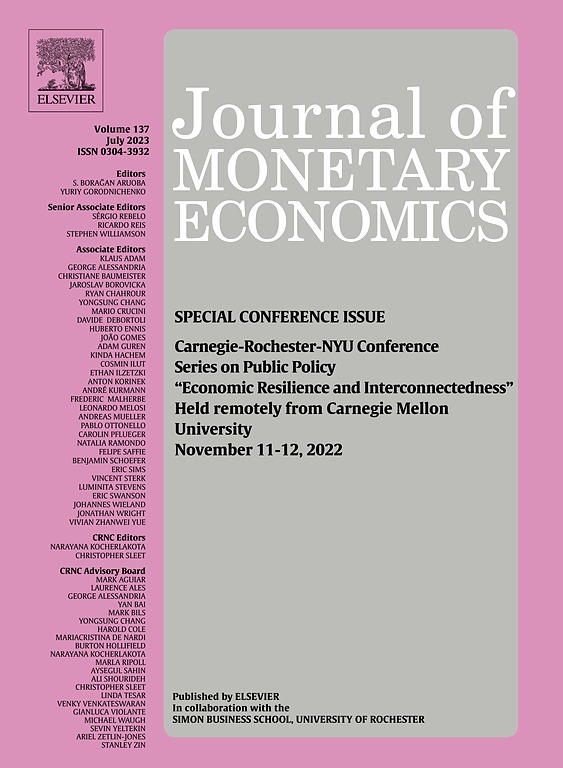
Understanding Post-Covid Inflation Dynamics
in: Journal of Monetary Economics, November 2023
Abstract
We propose a macroeconomic model with a nonlinear Phillips curve that has a flat slope when inflationary pressures are subdued and steepens when inflationary pressures are elevated. The nonlinear Phillips curve in our model arises due to a quasi-kinked demand schedule for goods produced by firms. Our model can jointly account for the modest decline in inflation during the Great Recession and the surge in inflation during the post-COVID period. Because our model implies a stronger transmission of shocks when inflation is high, it generates conditional heteroskedasticity in inflation and inflation risk. Hence, our model can generate more sizeable inflation surges due to cost-push and demand shocks than a standard linearized model. Finally, our model implies that the central bank faces a more severe trade-off between inflation and output stabilization when inflation is elevated.
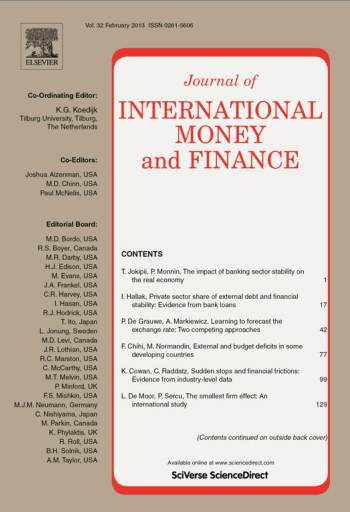
Conditional Macroeconomic Survey Forecasts: Revisions and Errors
in: Journal of International Money and Finance, November 2023
Abstract
Using data from the European Central Bank's Survey of Professional Forecasters and ECB/Eurosystem staff projections, we analyze the role of ex-ante conditioning variables for macroeconomic forecasts. In particular, we test to which extent the updating and ex-post performance of predictions for inflation, real GDP growth and unemployment are related to beliefs about future oil prices, exchange rates, interest rates and wage growth. While oil price and exchange rate predictions are updated more frequently than macroeconomic forecasts, the opposite is true for interest rate and wage growth expectations. Beliefs about future inflation are closely associated with oil price expectations, whereas expected interest rates are related to predictions of output growth and unemployment. Exchange rate predictions also matter for macroeconomic forecasts, albeit less so than the other variables. With regard to forecast errors, wage growth and GDP growth closely comove, but only during the period when interest rates are at the effective zero lower bound.

Evidence-based Support for Adaptation Policies in Emerging Economies
in: Low Carbon Economy, Nr. 1, 2023
Abstract
Climate change is increasingly evident, and the design of effective climate adaptation policies is important for regional and sectoral economic growth. We propose different modelling approaches to quantify the socio-economic impacts of climate change on three vulnerable countries (Kazakhstan, Georgia, and Vietnam) and design specific adaptations. We use a Dynamic General Equilibrium (DGE) model for Vietnam and an economy-energy-emission (E3) model for the other two countries. Our simulations until 2050 show that selected adaptation measures, in particular in the agricultural sector, have positive implications for GDP. However, some adaptation measures can even increase greenhouse gas emissions. Focusing on GDP alone can lead to welfare-reducing policy decisions.
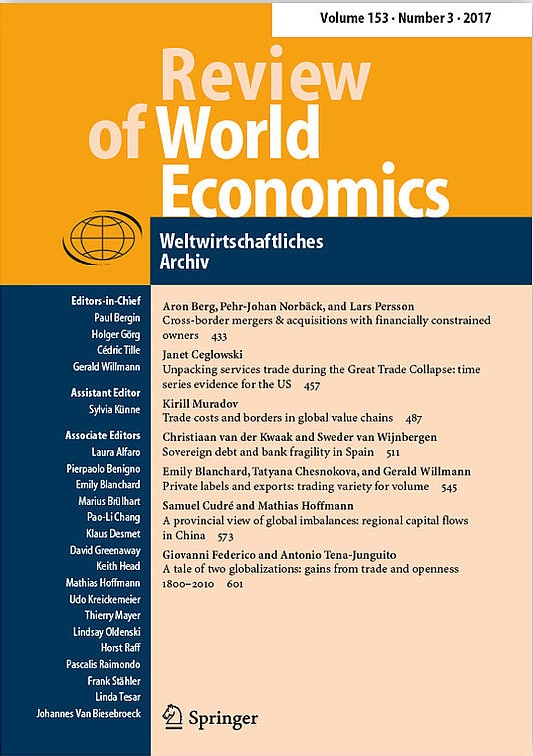
Monetary Policy in an Oil-dependent Economy in the Presence of Multiple Shocks
in: Review of World Economics, February 2023
Abstract
Russian monetary policy has been challenged by large and continuous private capital outflows and a sharp drop in oil prices during 2014. Both contributed to significant depreciation pressures on the ruble and led the central bank to give up its exchange rate management strategy. Against this background, this work estimates a small open economy model for Russia, featuring an oil price sector and extended by a specification of the foreign exchange market to correctly account for systematic central bank interventions. We find that shocks to the oil price and private capital flows substantially affect domestic variables such as inflation and output. Simulations for the estimated actual strategy and alternative regimes suggest that the vulnerability of the Russian economy to external shocks can substantially be lowered by adopting some form of inflation targeting. Strategies to target the nominal exchange rate or the ruble price of oil prove to be inferior.
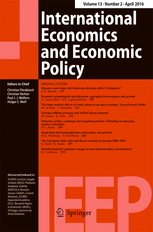
Business Cycle Characteristics of Mediterranean Economies: a Secular Trend and Cycle Dynamics Perspective
in: International Economics and Economic Policy, October 2022
Abstract
This study analyzes business cycle characteristics for all 20 major contemporaneous economies bordering the Mediterranean Sea based on annual real gross domestic product series for the period from 1960 to 2019. The region we investigate corresponds to the Mare Internum region of the Imperial Roman Empire during the Nerva-Antonine and early Severan dynasty, i.e., at the time of the maximum extent of the Roman Empire around 100 to 200 CE. The covered area encircles the Mediterranean, including economies now belonging to the European Union as well as acceding countries, Turkey, and the Middle East and North African economies. Using a components-deviation-cycle approach, we assess level trends and relative volatility of output. We also quantify the contribution of various factors to the business cycle variability within a region. We find cyclic commonalities and idiosyncrasies are related to ancient and colonial history and to contemporaneous trade relationships. Caliphate and Ottoman Empire membership as well as colonial rule in the twentieth century and contemporary Muslim share of population are the most promising predictors of business cycle commonalities in the region.
Arbeitspapiere
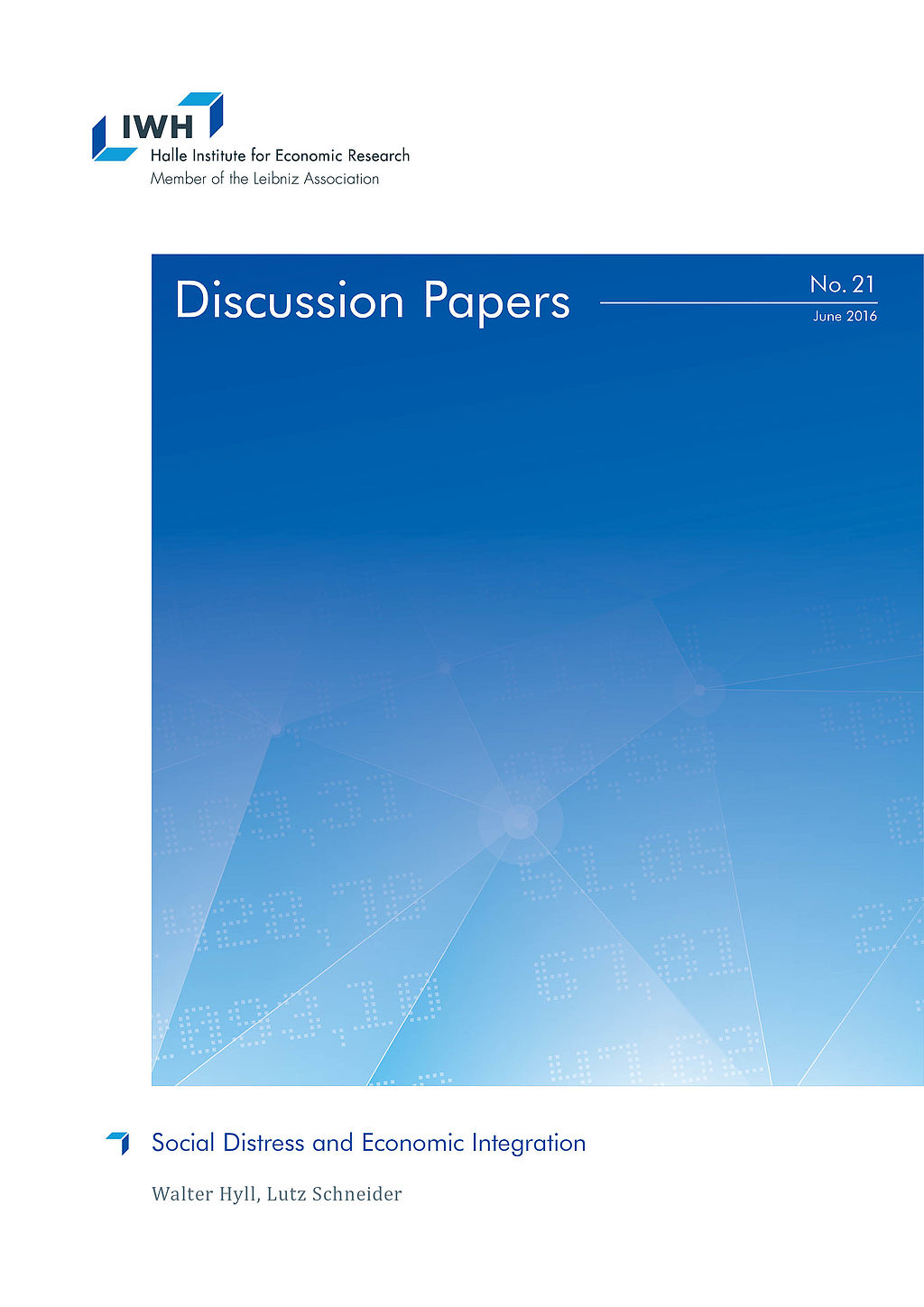
Outperforming IMF Forecasts by the Use of Leading Indicators
in: IWH Discussion Papers, Nr. 4, 2014
Abstract
This study analyzes the performance of the IMF World Economic Outlook forecasts for world output and the aggregates of both the advanced economies and the emerging and developing economies. With a focus on the forecast for the current and the next year, we examine whether IMF forecasts can be improved by using leading indicators with monthly updates. Using a real-time dataset for GDP and for the indicators we find that some simple single-indicator forecasts on the basis of data that are available at higher frequency can significantly outperform the IMF forecasts if the publication of the Outlook is only a few months old.

A Federal Long-run Projection Model for Germany
in: IWH Discussion Papers, Nr. 11, 2012
Abstract
Many economic decisions implicitly or explicitly rely on a projection of the medium- or long-term economic development of a country or region. In this paper, we provide a federal long-run projection model for Germany and the German states. The model fea-tures a top-down approach and, as major contribution, uses error correction models to estimate the regional economic development dependent on the national projection. For the medium- and long-term projection of economic activity, we apply a production function approach. We provide a detailed robustness analysis by systematically varying assumptions of the model. Additionally, we explore the effects of different demographic trends on economic development.

Does Central Bank Staff Beat Private Forecasters?
in: IWH Discussion Papers, Nr. 5, 2012
Abstract
In the tradition of Romer and Romer (2000), this paper compares staff forecasts of the Federal Reserve (Fed) and the European Central Bank (ECB) for inflation and output with corresponding private forecasts. Standard tests show that the Fed and less so the ECB have a considerable information advantage about inflation and output. Using novel tests for conditional predictive ability and forecast stability for the US, we identify the driving forces of the narrowing of the information advantage of Greenbook forecasts coinciding with the Great Moderation.

Is East Germany Catching Up? A Time Series Perspective
in: IWH Discussion Papers, Nr. 14, 2009
Abstract
This paper assesses whether the economy of East Germany is catching up with the West German region in terms of welfare. While the primary measure for convergence and catching up is per capita output, we also look at other macroeconomic indicators such as unemployment rates, wage rates, and production levels in the manufacturingsector. In contrast to existing studies of convergence between regions of reunified Germany, our approach is purely based upon the time series dimension and is thus directly focused on the catching up process in East Germany as a region. Our testing setup includes standard ADF unit root tests as well as unit root tests that endogenously allow for a break in the deterministic component of the process. In our analysis, we find evidence of catching up for East Germany for most of the indicators. However, convergence speed is slow, and thus it can be expected that the catching up process will take further decades until the regional gap is closed.

















